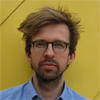will take place on Tuesday, 25 April 2017 from 17:15 to 18:15 hours in CBBM Research Building, EG, Room 50/51.
Host: Prof. Thomas Münte
Department of Neurology
University of Lübeck
Abstract
Understanding visual cognition in the brain requires answering three questions: what is happening where and when in the human brain when we see? In this talk I will present recent work that addresses these questions in an integrated analysis framework combining human magnetoencephalography (MEG), functional magnetic resonance imaging (fMRI) and deep neural networks (DNNs). The talk has three parts. In the first part, I will show how fMRI and MEG can be combined using multivariate analysis techniques (classification plus representational similarity analysis) to yield a spatio-temporally integrated view of human brain activity during object vision (Cichy et al., 2014 NatNeuro). In the second part I will show how DNNs can be used to understand the human visual system. We recently showed that DNNs predicted the spatial-temporal hierarchy of the human visual system, and that representations of abstract visual properties find an analogue in DNNs. In the third, shorter and speculative part I will describe ongoing work and future directions in both content and methods.
Biosketch
Radoslaw Martin Cichy is heading the Neural Dynamics of Visual Cognition group at Free University Berlin since May 2016. His research focuses on mapping and understanding the neural dynamics of visual object recognition, using MEEG, fMRI, and artificial neural networks. Before starting his own group, RM Cichy worked at the Computer Science and Artificial Intelligence Laboratory at MIT in the group of Aude Oliva. He earned his B.S. degree in Cognitive Science from the Univeristy of Osnabrück and his Ph.D. from Humboldt University, working at the Bernstein Center for Computational Neuroscience Berlin with John-Dylan Haynes.


